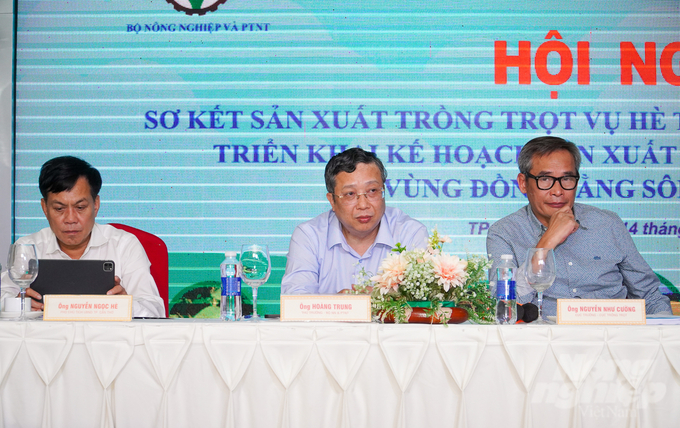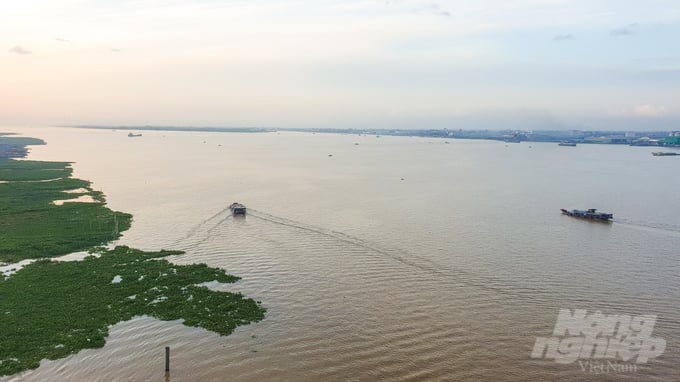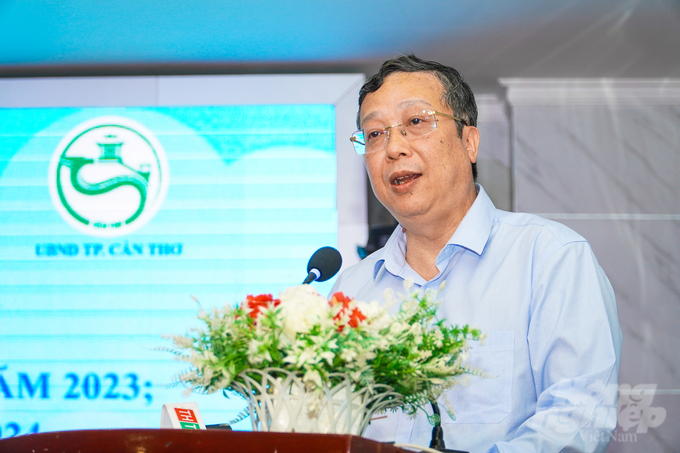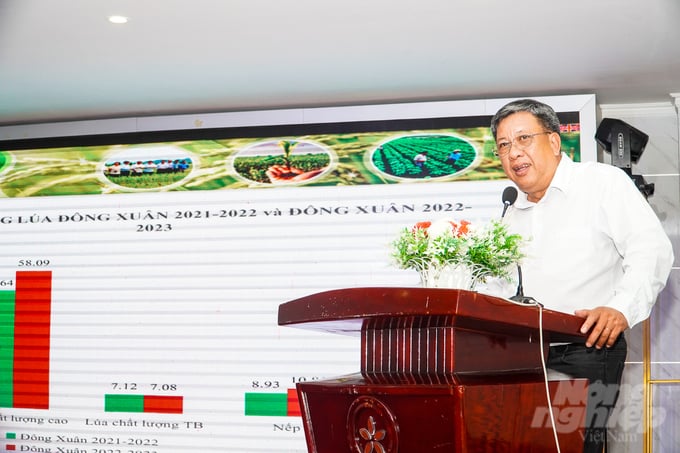May 20, 2025 | 06:28 GMT +7
May 20, 2025 | 06:28 GMT +7
Hotline: 0913.378.918
May 20, 2025 | 06:28 GMT +7
Hotline: 0913.378.918
On September 14 in Can Tho City, Deputy Minister of Agriculture and Rural Development Hoang Trung chaired a preliminary conference to summarize crop production in the summer-autumn, fall-winter, and 2023 seasons, deploy the production plan for the winter-spring crop of 2023 - 2024 in the Mekong Delta.

Preliminary conference on crop production in the summer-autumn, fall-winter, and 2023 seasons, implementing the winter-spring crop production plan for 2023 - 2024 in the Mekong Delta. Photo: Kim Anh.
According to a report from the Department of Crop Production (Ministry of Agriculture and Rural Development), the rice cultivation area in the Mekong Delta in 2023 is estimated to reach over 3.8 million ha, an increase of more than 13 thousand ha; productivity is estimated at nearly 63 tons/ha and output is estimated at nearly 24 million tons, an increase of 416 thousand tons over the same period in 2022.
In the winter-spring crop of 2023 - 2024, the Mekong Delta region plans to sow nearly 1.5 million ha, with an estimated yield of 72.24 tons/ha, and an output of over 10.6 million tons. Currently, the Department of Crop Production has provided a specific cropping time frame and planting area for each region in the Mekong Delta in the coming winter-spring crop.

The Southern Institute of Water Resources Research predicts that the risk of saltwater intrusion in the dry season of 2023 - 2024 will appear earlier and deeper than the average of many years. Photo: Kim Anh.
Mr. Tran Ba Hoang, Director of the Southern Institute of Water Resources Research, cited the forecast results of The National Center for Hydro-Meteorological Forecasting and said that the El Nino state will maintain until February 2024. The flood peak in the Mekong River upstream area is likely to appear in the first half of October. However, Mr Hoang estimates that the flood peak at stations in Tan Chau and Chau Doc will be lower than in the same period in 2022 and much lower than the average of many years.
Therefore, floods combined with high tides mainly occur in the middle and coastal areas with about 81 cells, with a scale of over 16 thousand ha at risk of being affected. Among them, Hau Giang province is the most affected, followed by Kien Giang. It is forecasted that the evolution of saltwater intrusion will be unpredictable, the risk of saltwater intrusion in the dry season 2023 - 2024 will appear earlier and deeper compared to the average of many years, at times equivalent to the period 2015 - 2016 and 2019 - 2020.
To successfully produce the winter-spring crop of 2023 - 2024, Deputy Minister Hoang Trung recommends that specialized agencies and localities in the Mekong Delta region focus on planting suitable to climate and weather conditions, preventing drought and saltwater intrusion. At the same time, update weather developments, meteorology, hydrology, and harmful organism forecasts to have timely response solutions.

Deputy Minister of Agriculture and Rural Development Hoang Trung requested specialized units and localities in the Mekong Delta region to focus on the successful production of the winter-spring crop of 2023 - 2024. Photo: Kim Anh.
The irrigation system needs to be strengthened and renovated to prepare to cope with drought, saltwater intrusion, and storing fresh water early. The Deputy Minister requested the Department of Crop Production to review, develop and deploy an appropriate and flexible production plan for the winter-spring crop of 2023 - 2024. For the autumn-winter rice area, the 2023 crop is ripe and needs to be harvested quickly.
Currently, the average amount of seeds sown in the Mekong Delta is 110kg/ha, this number is too high compared to the North (only about 40kg/ha). Therefore, Deputy Minister Hoang Trung requested localities to promote mechanization and raise awareness for local farmers in reducing the amount of seeds sown to reduce production costs and improve economic efficiency.
Mr. Le Thanh Tung, Deputy Director of the Department of Crop Production (Ministry of Agriculture and Rural Development), assessed that rice production in 2023 achieved the most success in the past 10 years. In addition to success in planted area and output, 2023 also recorded high rice prices and increased export output.

Mr. Le Thanh Tung, Deputy Director of the Department of Crop Production (Ministry of Agriculture and Rural Development) highly appreciated the results of rice production in 2023. Photo: Kim Anh.
Sharing the picture of the rice export market, Mr. Nguyen Ngoc Nam, Chairman of the Vietnam Food Association (VFA) analyzed, that at this time, Vietnamese rice businesses are starting to negotiate with customers to find rice export markets.
The sowing time for the early winter-spring crop begins on October 10 and will be harvested in January 2024. Meanwhile, the fall-winter 2023 crop has now begun harvest and it will last until December. This will create favourable conditions for businesses with raw materials to serve the rice export market.
Faced with concerns that from now until the end of 2023 and early 2024, Vietnam will not be able to export more than 1.2 million tons of rice compared to 2022, Mr Nam affirmed that this number is within the range of Vietnamese businesses.
“In the last 4 months of the year, on average, businesses can export 400 thousand tons of rice each month, which is normal. Because the enterprise's capacity to export rice by sea in the highest month is over 800 thousand tons", Mr. Nam is optimistic about the rice export market in the last months of the year.

Mr. Nguyen Ngoc Nam, Chairman of the Vietnam Food Association (VFA), is optimistic about the rice export market from now until the end of the year and into 2024. Photo: Kim Anh.
Also according to Mr. Nam, in recent years, the Philippines has been the number 1 export market of Vietnamese rice, accounting for over 40% of total rice exports. Recently, many partners from other countries have asked Vietnamese businesses to provide regular white rice at a price of $ 30 - 40/ton lower than the rice imported by private businesses.
However, Vietnamese businesses cannot meet the requirements for this type of rice. This proves that the quality of Vietnamese rice has been improved, maintaining the market, increasing c
Translated by Hoang Duy

(VAN) World Environment Day 2025 (June 5) carries the theme 'Beat Plastic Pollution' continuing to emphasize the global urgency of addressing the plastic waste crisis.

(VAN) This was the assessment shared by experts at the workshop titled 'Assessing the Role and Potential of Low-Emission Rice Production Systems in Vietnam,' held on the morning of May 19.

(VAN) Cai Rong Port is the fisheries control center of Quang Ninh, helping to monitor fishing vessels, combat IUU fishing, and remove the EC's 'yellow card'.

(VAN) The German Agricultural Society (DLG) explores the possibility of establishing a mechanization service center in Vietnam’s Mekong Delta to support farmers in accessing and utilizing advanced machinery.

(VAN) On May 16, the Department of Water Resources Management, in collaboration with the Food and Agriculture Organization of the United Nations (FAO), held a signing ceremony for the GEF-8 project document.

(VAN) Food safety, mechanization, vocational training, and market opening are key areas of cooperation expected between the Vietnamese Government and the Federal Republic of Germany.

(VAN) Deputy Minister Nguyen Quoc Tri also expressed his hope that Cuba will soon overcome its current challenges, attain food security, and further expand cooperation with Vietnam.